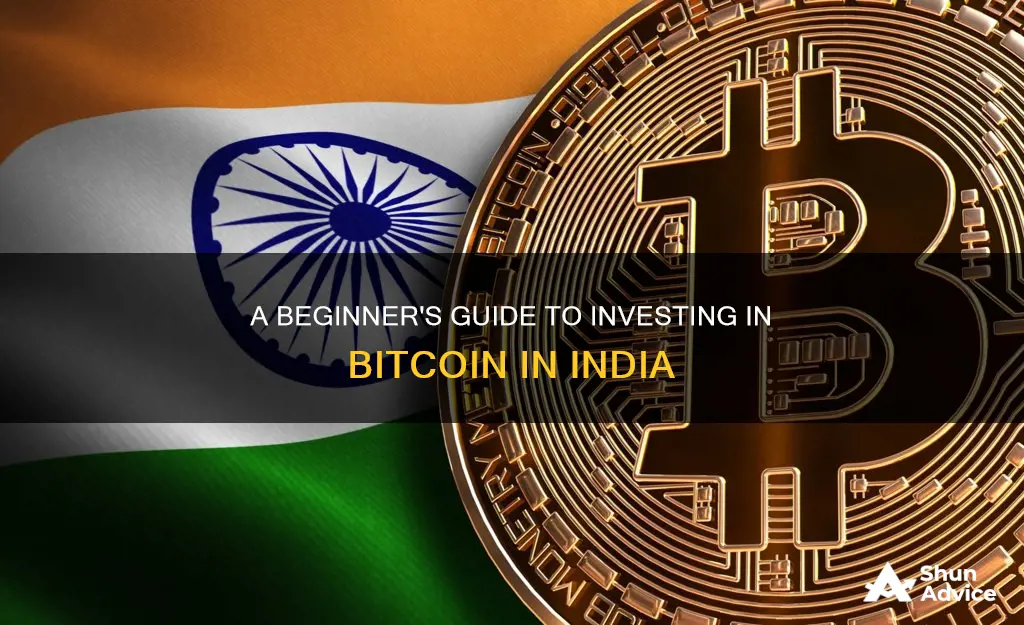
Bitcoin is one of the most sought-after cryptocurrencies in the world. In India, investors can purchase Bitcoin through online exchanges such as CoinDCX, ZebPay, WazirX, and Binance. These platforms allow users to buy and sell cryptocurrencies using various payment methods, including bank transfers, credit and debit cards, and digital wallets. It is important to note that while Bitcoin is not considered legal tender in India, it is not illegal to hold or transact in Bitcoins. Before investing, individuals must complete the KYC process and provide essential documents, such as the Aadhaar Card and PAN card.
| Characteristics | Values |
|---|---|
| Legal Status in India | Not considered legal tender |
| Minimum Investment | Rs 100 |
| Payment Options | Bank transfers, RTGS, NEFT, net banking, Mobikwik, cryptocurrency wallet, UPI, debit/credit cards, Google Pay, Apple Pay |
| Cryptocurrency Exchanges | Binance, CoinDCX, CoinSwitch, Mudrex, WazirX, ZebPay, Coinbase |
| Storage Options | Hot Wallets, Cold Wallets |

Using a crypto exchange
Step 1: Choose a Reputable Crypto Exchange
It is important to select a well-known and trusted crypto exchange that is registered with the Financial Intelligence Unit India. Some popular options include CoinDCX, CoinSwitch, Mudrex, WazirX, ZebPay, and Unocoin. These platforms offer various features such as low fees, user-friendly interfaces, and a wide range of cryptocurrencies to choose from.
Step 2: Complete the Registration and KYC Process
To get started, you will need to create an account on your chosen crypto exchange. This typically involves providing basic personal information, such as your name, email address, and creating a password. After registering, you will need to complete the Know Your Customer (KYC) process, which involves submitting documents such as your Aadhaar Card and PAN card. Make sure you have these documents ready to streamline the process.
Step 3: Fund Your Account
Once your account is set up, you will need to deposit funds into it before you can start investing in Bitcoin. Different exchanges offer different payment options, including bank transfers, net banking, UPI, and even credit or debit cards. Compare the fees associated with each payment method and choose the one that best suits your needs. Keep in mind that some exchanges may offer zero fees for specific payment methods.
Step 4: Place a Buy Order for Bitcoin
After funding your account, you can place your first order to buy Bitcoin. The process varies slightly between exchanges, but you will typically need to search for Bitcoin (BTC) on the exchange and then enter the amount you want to invest. Remember that you don't have to purchase a whole Bitcoin; you can invest as little as INR 100, depending on the exchange.
Step 5: Store Your Bitcoin Securely
Once you have purchased Bitcoin, you will need to decide how to store it. Most crypto exchanges provide integrated Bitcoin wallets or partner with wallet providers. However, some people prefer to use their own hot or cold wallets for added security. Consider your preferences for convenience and security when choosing a storage option.
Step 6: Monitor and Manage Your Investment
After investing in Bitcoin, it's important to keep track of its performance. You can use various online platforms and exchange platforms for daily updates on cryptocurrency prices and market movements. Remember that Bitcoin is a volatile investment, so be prepared for potential ups and downs. You can also consider setting up price alerts to stay informed about significant changes in Bitcoin's value.
Additional Considerations:
- Research and Education: Before investing in Bitcoin, it is essential to understand the market and the risks involved. Take the time to research the global and Indian crypto markets, track price movements, and familiarise yourself with different exchange platforms.
- Security: Always prioritise the security of your funds. Choose exchanges that implement robust safety measures, such as two-factor authentication, cold storage of funds, and bug bounty programs.
- Fees: Different exchanges charge different fees for deposits, transactions, and withdrawals. Be sure to review and compare these fees before choosing an exchange to minimise their impact on your investment returns.
- Customer Support: Opt for exchanges that offer responsive customer support to assist you with any issues or queries you may have during the investment process.
Shiba Inu Coin: Worth the Investment Risk?
You may want to see also

KYC verification
To invest money in Bitcoin in India, you will need to undergo Know Your Customer (KYC) verification. This is a legal requirement in India, and it is important in preventing fraud, money laundering, and other illegal activities.
To complete the KYC process, you will need to provide the following:
- A government-issued ID, such as a passport, National ID, or driver's license.
- Proof of address, such as a utility bill or bank statement.
- Selfies or videos to verify your identity.
- Information about the source of funds or the purpose of your crypto transactions.
- Transaction history, including activities from other wallets or exchanges.
It is important to note that the KYC requirements may vary slightly depending on the specific crypto exchange you are using. For example, some exchanges may require additional documents, such as the Aadhaar Card and PAN card, which are essential in India. Therefore, it is recommended to check the specific requirements of the exchange you plan to use.
The KYC verification process typically involves submitting the required documents and information to the crypto exchange, which will then review and approve your application. This process can vary in duration, ranging from a few hours to a few business days. It is important to provide accurate and complete information to ensure a smooth and timely verification process.
Best Places to Invest in Bitcoins in the US
You may want to see also

Payment options
After choosing a crypto exchange, you must fund your account before you can begin investing in Bitcoin. Depending on the exchange, you can fund your account through bank transfers, net banking, Mobikwik, a cryptocurrency wallet, or UPI.
CoinDCX does not charge a fee if you use UPI and bank transfers. However, it charges 0.5% on net banking. WazirX also requires you to top up your Mobikwik wallet using UPI or bank transfer before transferring the funds. Credit cards are not supported for wallet transfers, and charges depend on the getaway you use.
Because fees reduce the amount of money you can invest (and therefore also the amount of money you have to grow and compound), electronic transfers from a bank account tend to make more sense than other methods.
You can also buy Bitcoin with a debit or credit card, Google Pay, Apple Pay, or through third-party payment channels.
The Bitcoin Revolution: Your Guide to Investing
You may want to see also

Storage options
When it comes to storing your Bitcoin, there are several options available, each with its own advantages and disadvantages. Here are some of the most common storage options:
- Hot Wallets: These are wallets that are connected to the internet, such as online cloud wallets, mobile wallets, and software wallets. They are convenient for frequent trading and accessing your funds on the go. However, they are more vulnerable to hacks and theft since they are always connected to the internet. Examples include mobile wallets, desktop wallets, and web-based wallets.
- Cold Wallets: Cold wallets are offline storage solutions that allow you to keep your Bitcoin funds offline. This includes hardware wallets, paper wallets, and cold storage devices. Cold wallets are considered more secure than hot wallets since they are not connected to the internet. However, they may be less convenient for frequent trading. Examples include hardware wallets, paper wallets, and cold storage devices like USB drives.
- Hardware Wallets: These are physical devices, similar to a USB drive, that store your private keys offline. They are designed to be resistant to physical and digital attacks, making them a secure option for storing Bitcoin. Examples include Ledger Nano X and Trezor Model T.
- Paper Wallets: Paper wallets are physical copies or printouts of your public and private keys. While they provide offline storage, they are considered outdated and risky. It is not recommended to store large amounts of Bitcoin on paper wallets.
- Multi-signature Wallets: Multi-signature wallets require multiple private keys to access your Bitcoin funds. This adds an extra layer of security, as it requires the approval of multiple people to move funds. They can be set up between multiple parties, such as friends, family members, or business partners.
- Custodial Wallets: Custodial wallets are those where a third party, such as an exchange, holds your Bitcoin on your behalf. While they can be convenient, they come with risks since you don't directly control your private keys. Examples include exchanges like Coinbase.
- Non-Custodial Wallets: In contrast to custodial wallets, non-custodial wallets give you full control over your private keys. This means that you are responsible for storing and securing your keys, which can be done through hot or cold storage methods.
- Desktop Wallets: These are software programs installed on your computer that allow you to store and manage your Bitcoin. While they offer more security than hot wallets, they are still vulnerable to malware and hacks if your computer is connected to the internet.
- Mobile Wallets: Mobile wallets are applications installed on your smartphone that allow you to access and manage your Bitcoin on the go. They are convenient for frequent trading but may be less secure than other options since mobile devices are always connected to the internet.
It is important to note that regardless of the storage option you choose, it is crucial to enable two-factor authentication (2FA) and back up your private keys or seed phrases in multiple secure locations to protect your Bitcoin from loss or theft.
Bitcoin's Legitimacy: A Viable Investment Option?
You may want to see also

Legal status
The legal status of Bitcoin in India has been ambiguous. While it is not considered legal tender in the country, purchasing and holding Bitcoin is legal in India.
In 2018, the Reserve Bank of India (RBI) restricted commercial banks from facilitating Bitcoin transactions. However, this order was overturned by the country's apex court in 2020, allowing crypto exchanges to restart their business.
In 2021, the Indian government stated that it would do everything to discontinue the use of Bitcoin and other virtual currencies for criminal uses, reiterating that they are not recognised as legal tender. The government also expressed its intention to encourage blockchain technology in payment systems instead.
Despite the ambiguity, Bitcoin companies in India have witnessed an increase in customers. This can be attributed to factors such as the demonetization move in 2016, increased internet penetration, and the success of Bitcoin overseas.
To maintain their growing user base, Indian Bitcoin companies have implemented stringent security measures, including multiple security checks and the collection of valid ID proofs from users.
While the legal status of Bitcoin in India remains uncertain, the government has shown interest in understanding its workings and is working towards building regulatory frameworks.
The Ultimate Guide to Investing in Bitcoin
You may want to see also
Frequently asked questions
Yes, it is legal to buy Bitcoin in India. However, it is not considered legal tender, and there are questions over its legal status.
There is no minimum amount required to buy Bitcoin in India. You can buy fractional shares of Bitcoin, and some exchanges allow you to start investing with as little as 100 INR.
You can buy Bitcoin in India through online exchanges such as Binance, ZebPay, or Coinbase. You will need to complete a KYC process and provide documents such as your PAN card and address proof. Once you have chosen an exchange and registered, you can transfer funds from your bank account to the crypto exchange and place an order to purchase Bitcoin.







